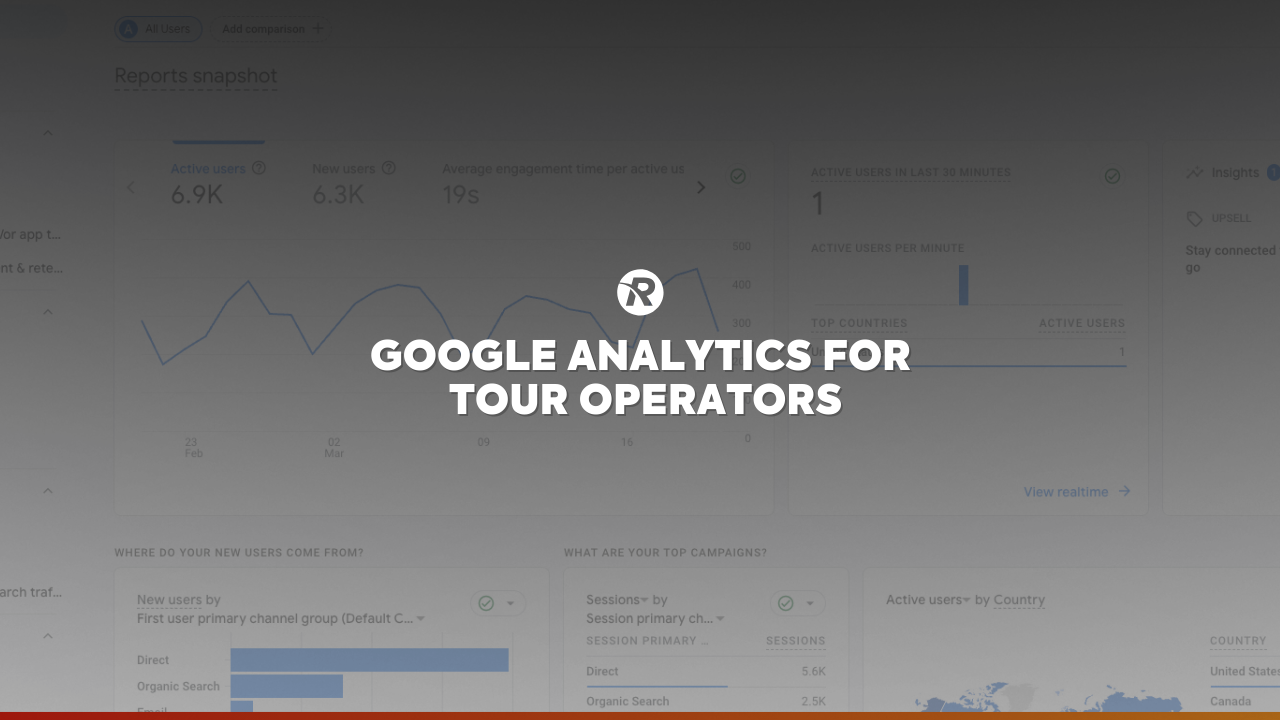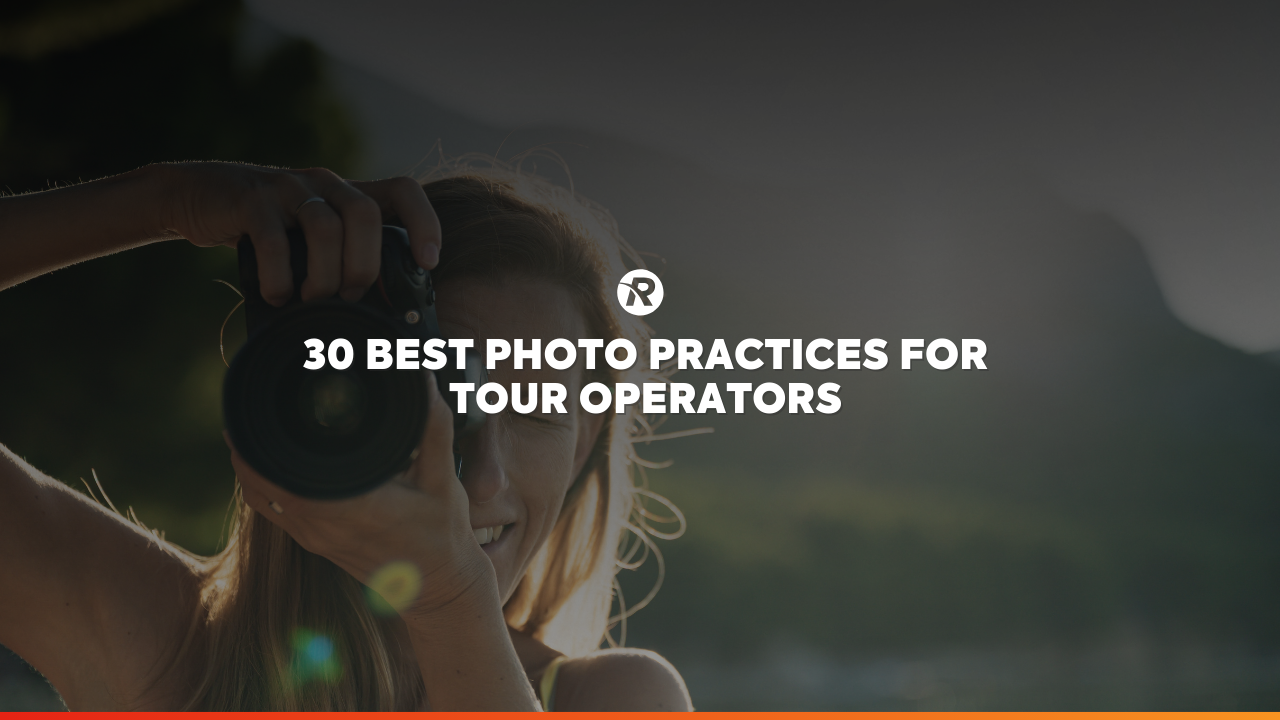Basic SEO Tips to Grow Your Tour Business Online
When people search for tours online, the first companies they see are often the ones they book with. That’s why search engine optimization (SEO) is essential for tour businesses. It helps you rank higher in Google results, increases your visibility, and attracts more of the right customers.
Whether you're just getting started or looking to sharpen your current efforts, this guide walks through key SEO strategies every tour operator should know. These tips are beginner friendly, effective, and designed to grow your business without feeling overwhelming.
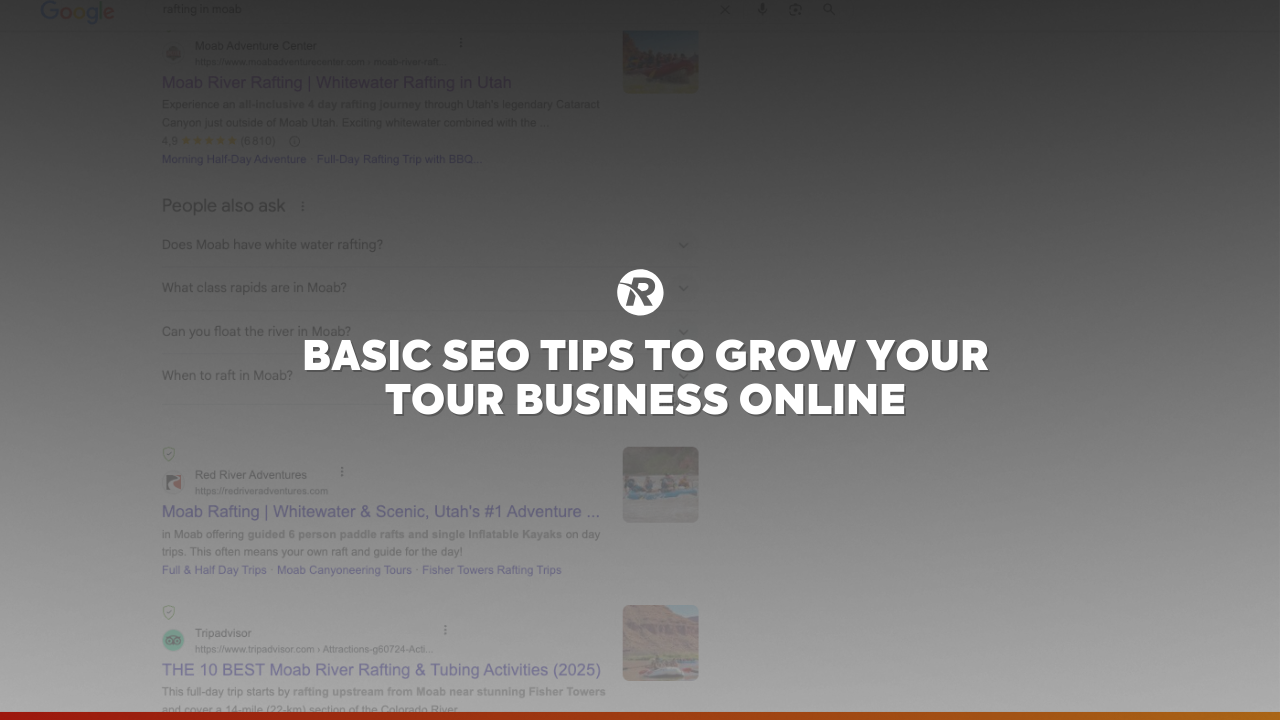
1. Start with Google Business Profile
For local visibility, nothing beats a well optimized Google Business Profile. It’s free, it boosts your visibility in Google Maps, and it gives potential travelers a snapshot of what you offer.
To make the most of it:
- Use your exact business name and location
- Add photos that showcase your tour experiences
- Include relevant services, hours, and booking info
- Choose the right category like “Tour Operator”
If you're looking for simple SEO solutions for tour operators, this is the place to start. Just optimizing your Google Business Profile can help you appear in local “near me” searches and map packs, even before your website ranks. Once your profile is up and running, don’t wait, start collecting those five-star reviews!
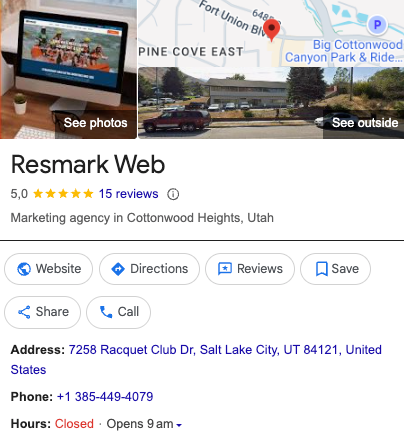
2. Use keywords that match what travelers are searching for
SEO starts with understanding your audience. People looking for tours in your area might search:
- “Cultural tours in [your city]”
- “Best adventure tour company near me”
- “Guided hikes [destination]”
By including these phrases naturally throughout your website copy, you help Google match your content to what people are actually looking for.
If you’re focused on adventure travel, make sure your site reflects that by using terms like adventure tour operator in blog titles, image descriptions, and service pages. It’s not about keyword stuffing, it’s about helping search engines and people understand exactly what you offer.
Where to start with keyword research
Not sure which keywords are worth targeting? Here are a few simple ways to start your research:
- Google Autocomplete: Start typing a phrase into Google like “best tours in [your city]” and see what suggestions appear. These are real search queries people are using right now.
- “People Also Ask” Box: Scroll through Google’s “People Also Ask” section when searching for tour-related terms. These are excellent content ideas that often match traveler intent.
- Google Keyword Planner: A free tool in Google Ads that helps you discover new keyword ideas and see monthly search volumes. You don’t have to run ads to use it, just create a free account.
- AnswerThePublic.com: Enter a keyword like “Zion hiking tours” and get a visual map of questions and phrases people are searching for. Great for finding long-tail keywords and blog post ideas.
For more free SEO tools, check out this blog post where we dive into other resources that can help your keyword strategy.
Once you’ve gathered a handful of good keywords, make sure to use them naturally across your homepage, tour descriptions, blog posts, and even photo alt text. And remember, every keyword should align with a real question or need your future guests are searching for.
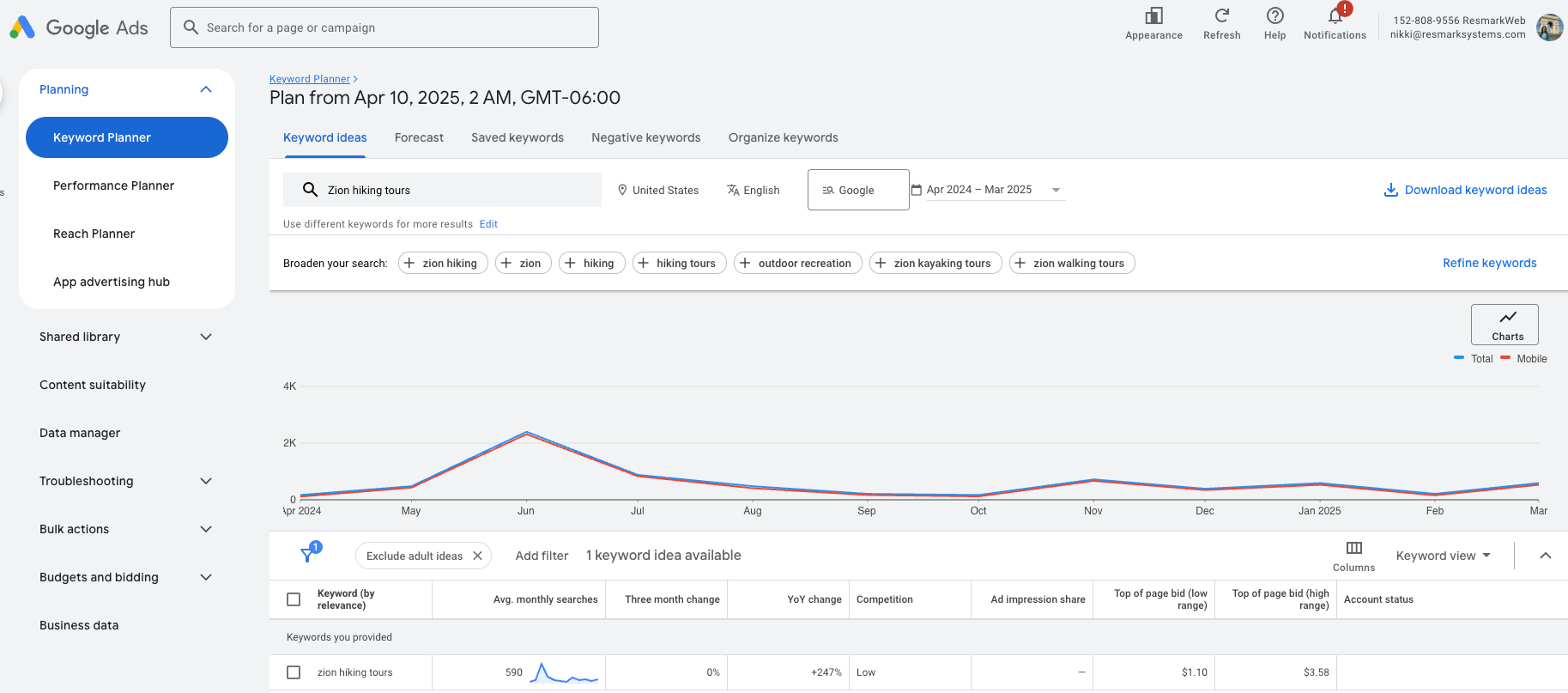
3. Create quality content that answers traveler questions
Your website should offer more than just dates and prices. Think about the questions travelers might ask before booking. Can I bring my kids? What’s included in the tour? What’s the best season to go?
Answer these in:
- Dedicated blog posts
- A well built FAQ page
- Detailed tour descriptions
For example, a blog post on “What to Pack for a Desert Hiking Tour” does more than help your customers. It gives you a chance to include valuable phrases like SEO for tourism businesses in a natural way.
If content creation feels like a big lift, start small. Write one post per month and build from there. Consistency matters more than perfection.
4. Set up Google Analytics
You can’t improve what you don’t measure. Google Analytics for tour operators is a must have tool that helps you understand where your traffic is coming from, which pages are working, and where people drop off.
With Google Analytics you can:
- Track bookings back to SEO efforts
- Identify your most popular pages
- Spot slow loading or underperforming content
If you're investing in SEO services for tour companies or considering hiring a professional, having analytics in place is crucial. It ensures you’re not flying blind with your marketing.
5. Optimize website speed and mobile experience
Google favors websites that load quickly and work well on phones. A beautiful site with stunning tour images won’t help you if it takes too long to load or is difficult to navigate on a small screen.
See how fast your website loads by going to PageSpeed Insights.
Quick wins:
- Compress image files
- Use clear headings and simple layouts
- Make call to action buttons big and easy to tap
- Avoid popups that block mobile users
This is where even the best tour operator SEO can fall short. If your site loads slowly, you’ll drop in rankings no matter how good your content is.
Learn how to make sure your website loads fast.
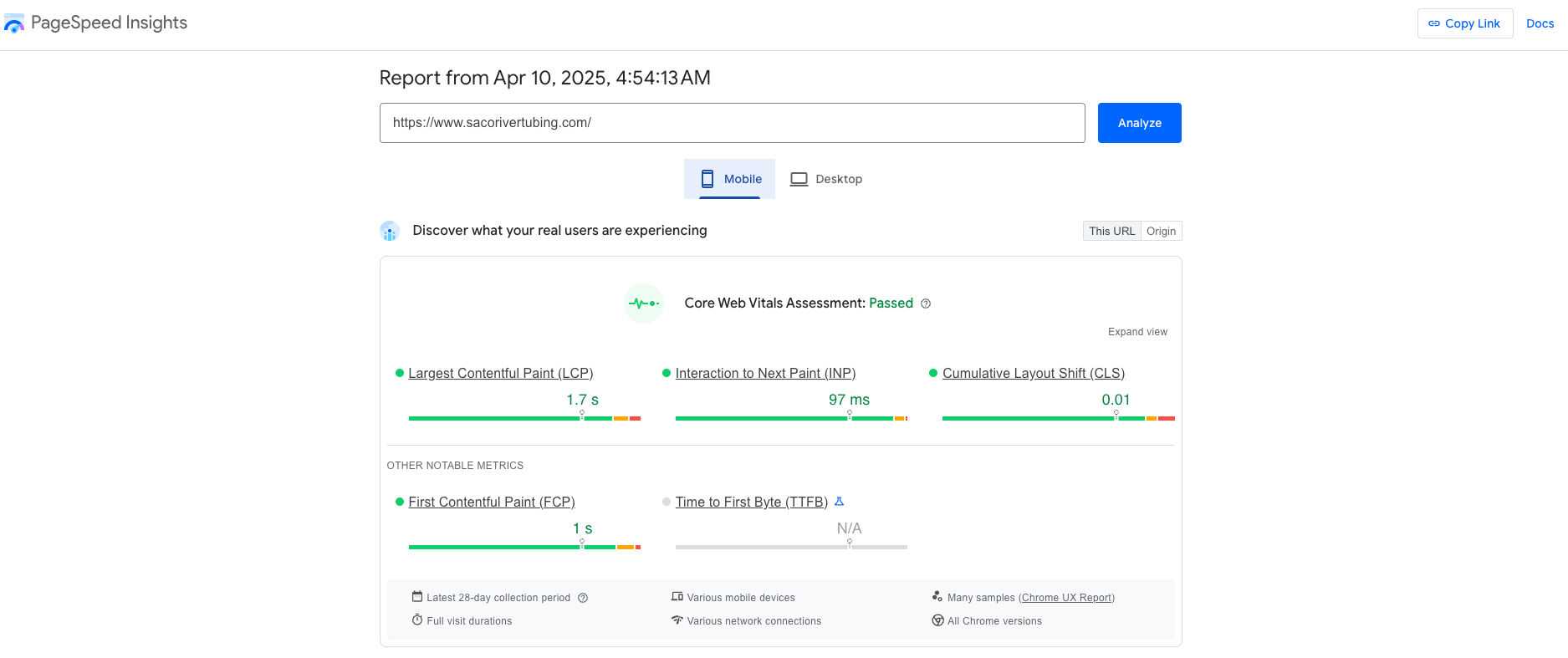
6. Get backlinks from local partners and directories
Backlinks link from other websites to yours, and tell Google that your content is trustworthy and worth showing. Focus on getting listed in reputable directories, and build real partnerships in your community.
Start with:
- Tourism boards
- Local hotels or restaurants
- Travel blogs in your region
You might also consider writing guest posts or offering testimonials in exchange for a link. An SEO agency’s strategy often includes backlink outreach because it’s a proven way to grow authority and improve your rankings.
7. Invest in ongoing SEO strategy
SEO isn’t a one time fix. It’s a long term strategy that requires consistency and regular attention. Search engines like Google are constantly updating their algorithms to prioritize content that is fresh, relevant, and user friendly. Meanwhile, your competitors are also improving their websites, adding new content, and adapting to the same changes. If you stop investing in SEO, you risk falling behind, even if you started strong.
A strong ongoing SEO strategy should include:
- Regular keyword research to uncover new trends and shifts in how travelers search for tours
- Website content updates to keep your service pages accurate and your blogs relevant
- New blog publishing or optimization to target long tail keywords and answer evolving customer questions
- Monthly performance reviews to assess traffic trends, identify drop offs, and celebrate wins
This ongoing process helps your site continue to climb in rankings, attract the right traffic, and drive bookings all year round.
Why professional support can help
Managing SEO on your own is possible, but as your business grows, the value of expert guidance increases. If you’re considering professional SEO services for tour companies, make sure you choose a provider who understands both sides of the equation.
They should be comfortable with:
- Technical SEO tasks like improving site speed, optimizing mobile usability, and maintaining clean site architecture
- Content strategy that speaks to your ideal customer, builds trust, and encourages bookings
Look for a provider who asks about your business goals, not just your traffic numbers. The best SEO partners will align their efforts with real world outcomes like more inquiries, more conversions, and more reservations.
A trusted SEO consultant or agency can also help you stay ahead of industry changes, implement schema markup for better search appearance, and plan campaigns tied to seasonal demand or new tour offerings. When SEO is done right, it becomes a sustainable engine for growth, not just a marketing checklist.
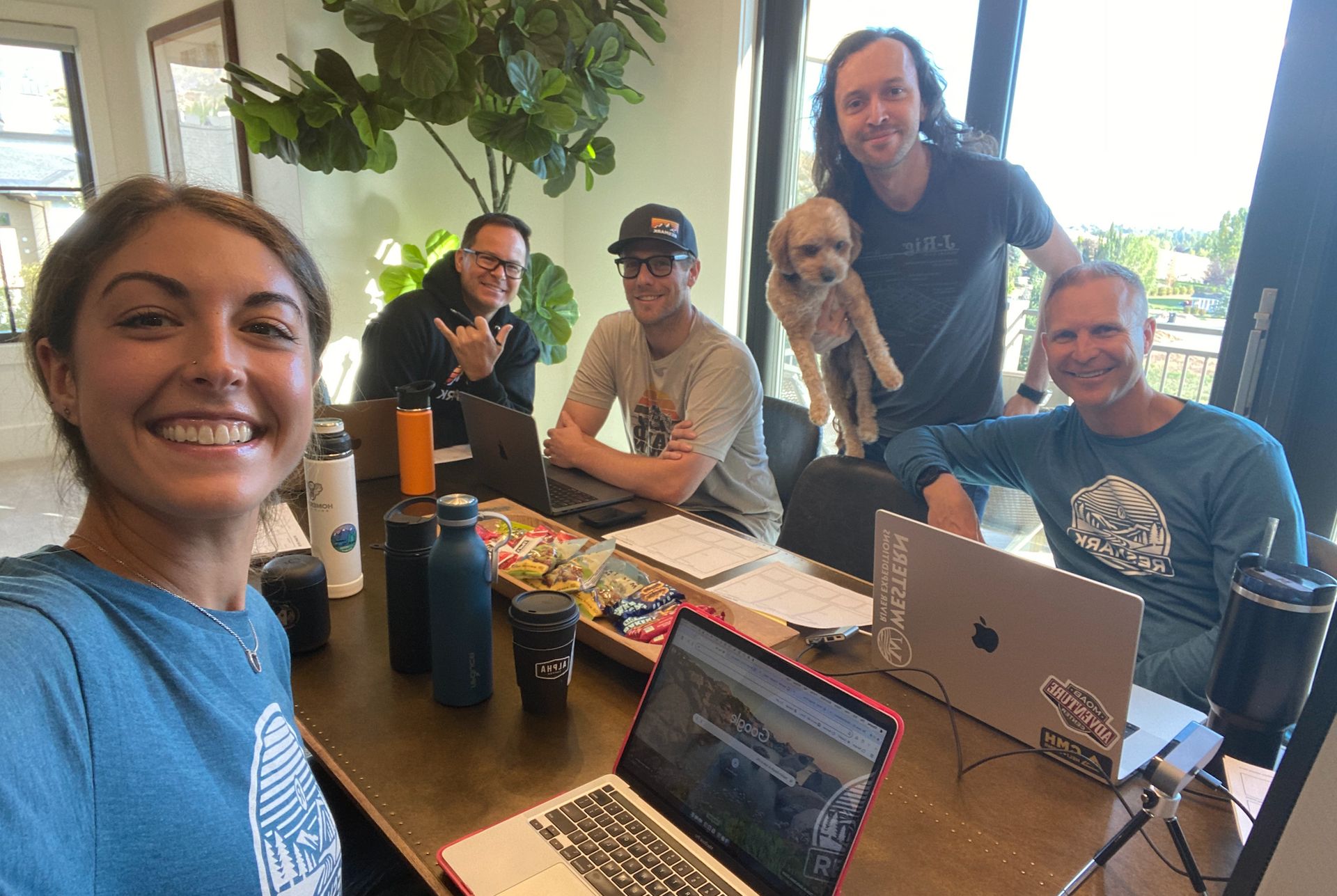
Start with the basics and build momentum
You don’t need to master every aspect of SEO today. Start by claiming your Google Business Profile, adding traveler focused content to your website, and learning how people find your site using Google Analytics.
As you grow, you can layer in more advanced techniques like backlinks and keyword clusters. With the right foundation, your SEO efforts will help you stand out, get found, and book more travelers with no ads required.
If you're looking for SEO services from a professional, book a free discovery call with ResmarkWeb, we'd love to chat! 👇
FAQs: SEO made simple for tour businesses
What is the difference between local SEO and general SEO for my tour business?
Local SEO helps you show up in map results and “near me” searches. It’s ideal if you serve a specific destination or city. General SEO covers broader search visibility across larger areas or topics. For most tour companies, local SEO delivers faster results and better booking potential.
How do I choose the right keywords for my website?
Focus on how your ideal customers think. Use tools like Google Keyword Planner or SEO.AI to find terms like “eco tours in Arizona” or “sunset kayak tour [city]”. Use these in your page titles, descriptions, and throughout your content to help search engines understand your focus.
Is it really necessary to blog for SEO?
Yes. Blogging helps you show up for more searches and gives travelers useful info that builds trust. You don’t need to write every week, one quality blog a month can help you rank for long tail keywords and show up when travelers search for advice.
How often should I update my website for SEO?
Aim for monthly updates. Add a new blog post, refresh your homepage for seasonal offers, or tweak service descriptions. Search engines prefer websites that are regularly maintained with fresh, helpful content.
What are backlinks and why do they matter?
Backlinks are links from other websites to yours. Google uses them as trust signals. The more quality sites that link to your business, the more authority you earn. Get listed on tourism sites, collaborate with local partners, or pitch stories to regional bloggers.
I’m not tech savvy, can I still do SEO on my own?
Definitely. Start with the basics like updating your content, claiming your Google profile, and adding keywords that match your tours. As your business grows, you can bring in a professional for technical help, but there’s a lot you can do solo.
What kind of images help with SEO?
Use real photos from your tours and name them clearly like “sunset-hike-zion.jpg”. Add alt text describing what’s in the image so search engines can index them. Compressed images help your site load faster too, which improves SEO.
How can I tell if my SEO is working?
Track traffic using Google Analytics and Google Search Console. If your organic visits increase, bounce rate drops, and bookings grow, your SEO efforts are on the right track. Monitoring monthly helps you adjust and stay ahead of competitors.


